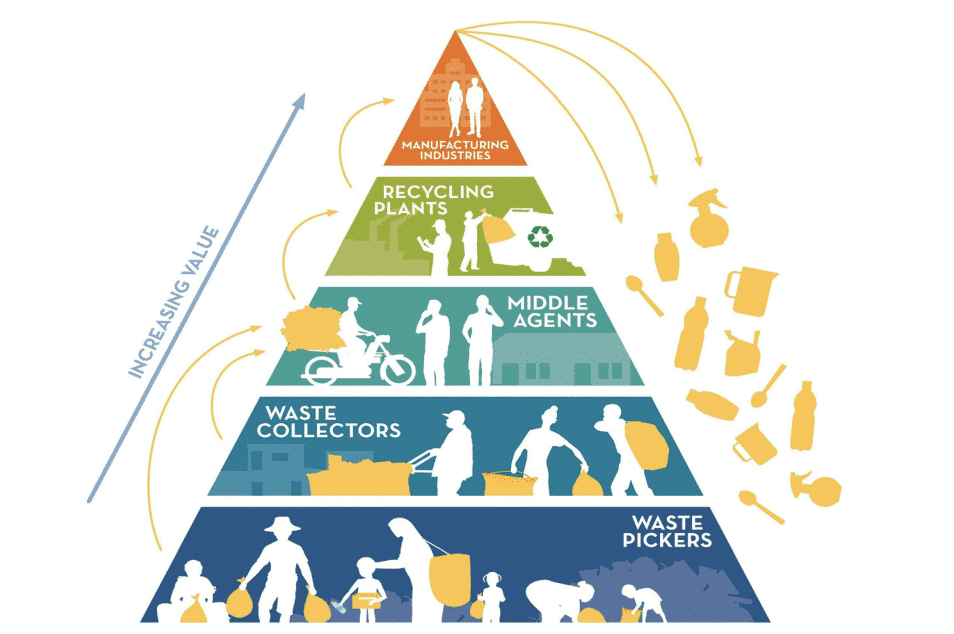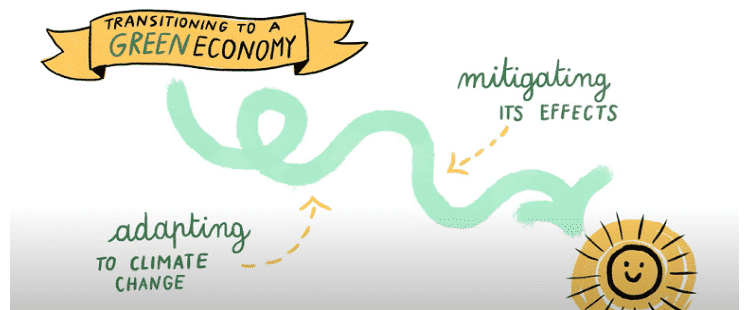
By Joscha Betke
This blog is part of a research project on the opportunities for decent work for youth in Africa’s Waste Recycling Sector, in collaboration with the Challenge Fund for Youth
Employment (CFYE).
Waste management in Africa is a major challenge for sustainable and inclusive development. Due to poor management, 90% of the waste generated in Africa is disposed of in landfills and uncontrolled dumpsites with severe consequences for the environment and people working in the waste management sector.
Despite these challenges, there might be room for optimism. The circular economy is heralded by many as an approach of greening not only production processes, but in particular the way current linear economies deal with their waste. Particularly in the waste management sector, the existing gaps in waste collection and disposal systems can turn into opportunities for waste reuse, recycling and recovery. Waste recycling, thus, emerges as a hopeful solution to close the loop of an unsustainable linear production-to-waste system and to create new “green jobs” for Africa’s increasing youth population.
This assumption is based on the proposition that by expanding opportunities for recycling, waste material can be brought back into the economy. This adds value to waste locally and creates new economic opportunities for remanufacturing, which in turn will boost employment creation. Although a well-researched topic, there are a number of persisting complexities and barriers to green jobs for youth in the waste sector that remain under explored and need to be addressed.
Addressing these pressing knowledge gaps to inform better policies and programming, our new research project in partnership with the Challenge Fund for Youth Employment (CFYE) explores promising pathways for green jobs in the plastic waste recycling sector. Therefore, this research will combine insights from literature and practice, looking more closely at two Kenyan social enterprises from the CFYE portfolio, Mr. Green Africa and TakaTaka Solutions. These pioneering companies put forth technology-driven plastics recycling models enabling waste collection at the source, which creates new jobs and integrates informal waste workers and micro- entrepreneurs in the formal value chain.
Unravelling the Loop: Exploring Research Gaps and Controversies
Based on a quick scan of academic and grey literature, this article presents three areas of controversy that require further attention:
1. Green jobs = decent jobs?
Next to maintaining or restoring environmental quality, the previous collaborative research project of INCLUDE and CFYE has made explicit that green jobs also have to generate and support human wellbeing by creating decent employment and improving the quality of existing jobs. In short: Yes, a green job has to be decent. Currently, 90% of recycling in Africa is carried out by informal workers usually working in uncontrolled dumpsites. Although informal waste workers play a vital role in gathering waste and curbing pollution, they face social stigma and insecure working conditions that range from economic and social insecurities to safety risks and health hazards. This explains why literature mainly focuses on approaches to improving the situation of informal waste pickers and collectors. Strategies range from forming waste picker cooperatives, which increase their bargaining power with other ecosystem players, to innovative socio-economic support structures offered by pioneering waste recycling companies.
Current strategies to improve the job quality include offering a higher pay, stable income, awareness training, or personal protective equipment. However, there remains a knowledge gap concerning how these opportunities can address the social stigma around waste recycling. This begs the question, how can the informal waste recycling sector become decent in the eyes of youth?
2. How to move up the waste recycling hierarchy?
Beyond informal waste picking there are a number of other job opportunities in the waste recycling sector. Literature often refers to the term “waste recycling hierarchy”, to describe the process of value addition and the intermediate steps in the life-cycle of transforming waste to valuable products. Besides opportunities for waste pickers at the lowest level, there are many different types of jobs along the waste recycling hierarchy. Waste pickers might be able to “move up” the waste recycling hierarchy to become waste collectors, middle agents, or work in recycling plants and in the
manufacturing industry (see picture below).

The Plastic Waste Recycling Hierarchy, Barford (2020)
As described earlier, research predominantly focuses on the opportunities for decent employment at the lowest levels of the plastic waste hierarchy, particularly among informal waste pickers. The main reason being that it currently employs by far the largest number of people mostly under indecent conditions. However, this does not automatically mean that it has the greatest potential to create green jobs, or to improve the quality of existing jobs.
The question remains, how can young people effectively seize and engage with green job opportunities throughout the whole waste recycling value chain, which ranges from waste collection to sorting, processing and repurposing? Literature raises a potential mismatch of specific skills or educational background that are needed to benefit from and engage with these opportunities as a point of attention. This research will specifically look into the potential for waste pickers to acquire new skills and enhance their job prospects in order to move up the value chain.
3. How can technical and social innovations contribute to green jobs?
Following the projections of the Africa Waste Management Outlook and statements on behalf of the AU High-Level Panel on Emerging Technologies the volume of waste generated will continue to increase sharply. Currently, the average recycling rate of formal municipal solid waste in Africa is estimated at only 4 per cent. However, attention towards recycling is increasing, as evidenced by the emergence of more sustainable modes of waste disposal and management through leveraging emerging waste recycling technologies, such as employing new sorting, processing and hot-washing machines and processes that transform old and contaminated waste into clean new products. Recycling is commonly done by waste recycling businesses, supported by a large, and active, informal sector that includes intermediate collection agents and waste pickers. Scaling innovative social enterprises that employ these technologies and simultaneously aim to integrate informal workers under more decent working conditions is, thus, promoted as a solution to deal with the current growth rate of waste and increasing under- and unemployment.
Nevertheless, understanding how to scale such innovations as well as policy frameworks that are needed to create a conducive environment for these new businesses to thrive, and consequently offer more employment opportunities, remains largely unexplored. Additionally, gaining insight into the financial viability of the waste recycling sector as a whole and policies supporting job creation within it is essential to understand how it can contribute to green jobs for youth.
A detrimental challenge to this up-and-coming sector is that recycling often fails to be financially attractive due to the costs involved in collecting, sorting, and remanufacturing recyclable materials, making it less appealing than using new materials. Thus, when looking at the potential of waste recycling initiatives to create and maintain decent jobs for youth across Africa, it should be recognized that the cost of collecting and processing recyclable materials needs to be covered in order to make recycling financially attractive and attract investment.
This is where a supportive policy environment comes into play. There is political momentum in this regard, as witnessed by the recently initiated Extended Producer Responsibility (EPR) programs in Senegal, Gambia, and Zimbabwe, which led to higher recycling rates and job creation. In such programs, the companies taking products to market are held accountable for their packaging and are required to pay for its collection and recycling after use. This should increase the demand for recycling and lower the costs in the long-run, thereby attracting sufficient funding that can support collection, sorting, and recycling at scale for more job creation.
However, literature uncovered that current supportive policies do not always work in practice, yet, because they are fragmented and often not well aligned. Therefore, this research will further explore how innovative recycling initiatives can be supported to sustain their business case in order to be able to offer green jobs on demand by means of key informant interviews with companies’ management.
Closing the loop: Identifying Green Job Pathways
To conclude, it remains a question how to actually promote the creation of green jobs in the waste management sector structurally and sustainably in practice in a way that not only improves the livelihoods of informal waste workers, but also generates new green and decent employment opportunities.
This collaborative research project will therefore look into pathways for green job creation in the waste recycling sector throughout the waste recycling hierarchy. Both the social stigma and the creation of a supportive environment for innovative waste recycling initiatives will be taken into account.
